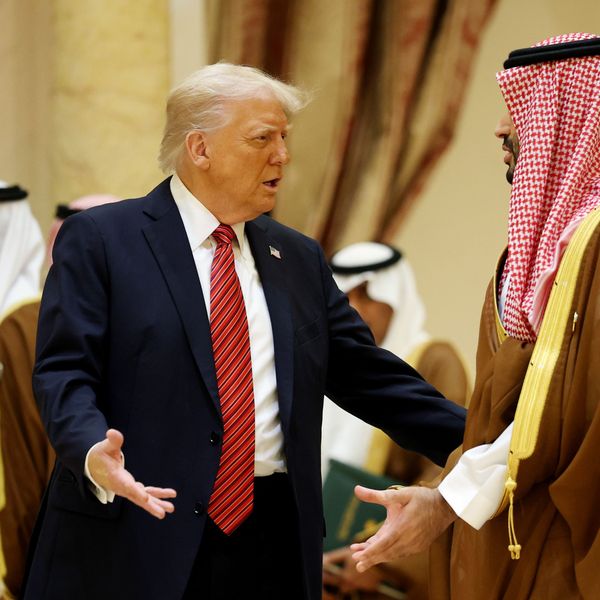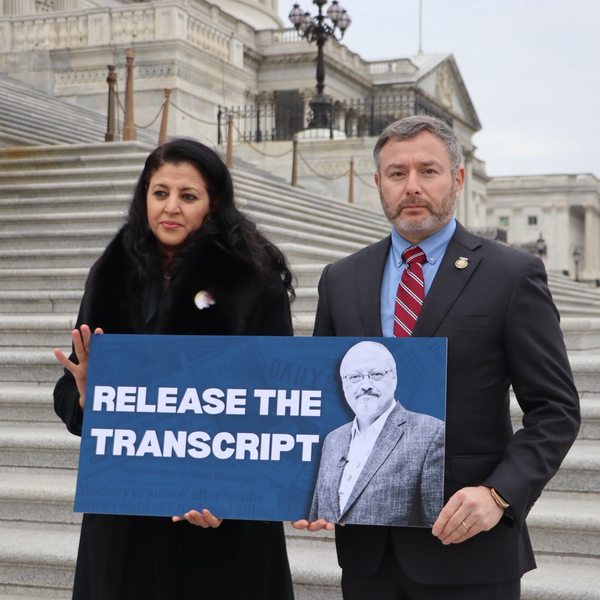No Meeting of Minds in Jeddah
Gordon Brown's pleas for proceeds from the oil shock to be invested in renewables will fall on deaf ears
When physicians differ radically on the cause of a malady, they cannot prescribe a cure, and so the patient is condemned to go on suffering. That, in short, is the summary of the deliberations of the oil summit held in the Saudi city of Jeddah on Sunday -- as expressed in medical terms, the patient being the petroleum-consuming world.
King Abdullah, the host, representing the producer nations, blamed "the selfish interests" of the speculators at the New York Mercantile Exchange (Nymex) and International Petroleum Exchange (IPE) in London as the major reason for the unprecedented spurt in the price of oil, which closed at nearly $135 a barrel on Friday.
Contesting this view, US energy secretary, Samuel Bodman, baldly declared that there was "no evidence" that the speculators were driving future prices of petroleum.
It was left to Gordon Brown to state the basic fact: oil demand is rising faster than supply.
So the solution lies in increasing the supply - now. The only oil producing country that can do so - soon - is Saudi Arabia. King Abdullah announced an increase of 200,000 barrels per day (bpd), thus confirming the week-old leak, which the market has already factored in.
Nor was there anything new in the announcement by the Saudi oil minister, Ali al-Naimi, that his country's production capacity would be raised to 12.5 million bpd by the end of 2009. In the lives of the Nymex and IPE, that is a long way ahead.
That was the sort of timeframe that Brown had when presenting his "two way" deal between oil producers and consumers based on the idea of more freedom to invest in each other's markets.
Brown's plan requires Opec member states, currently exploiting their hydrocarbon resources exclusively through their state-owned companies, to allow western corporations to invest in oil fields and refineries in their countries.
In return, western countries would provide opportunities for Opec nations to take a major financial stake in the fast expanding renewable energy industries in the west.
A nice idea. But it ignores a key fact. Due to the high hydrocarbon prices, Opec treasuries are flush with cash. So their state-owned oil companies can buy the specialist services of the western oil giants for cash without giving them any stake in the ownership of their countries' oil and gas fields.
As for investing in the west, the managers of the super-affluent sovereign funds of these oil-rich nations have been taking their decisions in purely economic terms. Indeed they are told in no uncertain terms to do just that by the mighty US government.
The sovereign funds of states like the United Arab Emirates and Kuwait are an important part of the financial scene in London. Taking advantage of the softening in the housing market in Britain, they have been snapping up landmark commercial properties in the City of London, the financial hub of the capital.
As for the international oil market, with no meaningful increase in petroleum supplies on the horizon in the near future, the oil price is now set to cross the psychologically important threshold of $150 a barrel in the next few weeks.
An Urgent Message From Our Co-Founder
Dear Common Dreams reader, The U.S. is on a fast track to authoritarianism like nothing I've ever seen. Meanwhile, corporate news outlets are utterly capitulating to Trump, twisting their coverage to avoid drawing his ire while lining up to stuff cash in his pockets. That's why I believe that Common Dreams is doing the best and most consequential reporting that we've ever done. Our small but mighty team is a progressive reporting powerhouse, covering the news every day that the corporate media never will. Our mission has always been simple: To inform. To inspire. And to ignite change for the common good. Now here's the key piece that I want all our readers to understand: None of this would be possible without your financial support. That's not just some fundraising cliche. It's the absolute and literal truth. We don't accept corporate advertising and never will. We don't have a paywall because we don't think people should be blocked from critical news based on their ability to pay. Everything we do is funded by the donations of readers like you. Will you donate now to help power the nonprofit, independent reporting of Common Dreams? Thank you for being a vital member of our community. Together, we can keep independent journalism alive when it’s needed most. - Craig Brown, Co-founder |
When physicians differ radically on the cause of a malady, they cannot prescribe a cure, and so the patient is condemned to go on suffering. That, in short, is the summary of the deliberations of the oil summit held in the Saudi city of Jeddah on Sunday -- as expressed in medical terms, the patient being the petroleum-consuming world.
King Abdullah, the host, representing the producer nations, blamed "the selfish interests" of the speculators at the New York Mercantile Exchange (Nymex) and International Petroleum Exchange (IPE) in London as the major reason for the unprecedented spurt in the price of oil, which closed at nearly $135 a barrel on Friday.
Contesting this view, US energy secretary, Samuel Bodman, baldly declared that there was "no evidence" that the speculators were driving future prices of petroleum.
It was left to Gordon Brown to state the basic fact: oil demand is rising faster than supply.
So the solution lies in increasing the supply - now. The only oil producing country that can do so - soon - is Saudi Arabia. King Abdullah announced an increase of 200,000 barrels per day (bpd), thus confirming the week-old leak, which the market has already factored in.
Nor was there anything new in the announcement by the Saudi oil minister, Ali al-Naimi, that his country's production capacity would be raised to 12.5 million bpd by the end of 2009. In the lives of the Nymex and IPE, that is a long way ahead.
That was the sort of timeframe that Brown had when presenting his "two way" deal between oil producers and consumers based on the idea of more freedom to invest in each other's markets.
Brown's plan requires Opec member states, currently exploiting their hydrocarbon resources exclusively through their state-owned companies, to allow western corporations to invest in oil fields and refineries in their countries.
In return, western countries would provide opportunities for Opec nations to take a major financial stake in the fast expanding renewable energy industries in the west.
A nice idea. But it ignores a key fact. Due to the high hydrocarbon prices, Opec treasuries are flush with cash. So their state-owned oil companies can buy the specialist services of the western oil giants for cash without giving them any stake in the ownership of their countries' oil and gas fields.
As for investing in the west, the managers of the super-affluent sovereign funds of these oil-rich nations have been taking their decisions in purely economic terms. Indeed they are told in no uncertain terms to do just that by the mighty US government.
The sovereign funds of states like the United Arab Emirates and Kuwait are an important part of the financial scene in London. Taking advantage of the softening in the housing market in Britain, they have been snapping up landmark commercial properties in the City of London, the financial hub of the capital.
As for the international oil market, with no meaningful increase in petroleum supplies on the horizon in the near future, the oil price is now set to cross the psychologically important threshold of $150 a barrel in the next few weeks.
When physicians differ radically on the cause of a malady, they cannot prescribe a cure, and so the patient is condemned to go on suffering. That, in short, is the summary of the deliberations of the oil summit held in the Saudi city of Jeddah on Sunday -- as expressed in medical terms, the patient being the petroleum-consuming world.
King Abdullah, the host, representing the producer nations, blamed "the selfish interests" of the speculators at the New York Mercantile Exchange (Nymex) and International Petroleum Exchange (IPE) in London as the major reason for the unprecedented spurt in the price of oil, which closed at nearly $135 a barrel on Friday.
Contesting this view, US energy secretary, Samuel Bodman, baldly declared that there was "no evidence" that the speculators were driving future prices of petroleum.
It was left to Gordon Brown to state the basic fact: oil demand is rising faster than supply.
So the solution lies in increasing the supply - now. The only oil producing country that can do so - soon - is Saudi Arabia. King Abdullah announced an increase of 200,000 barrels per day (bpd), thus confirming the week-old leak, which the market has already factored in.
Nor was there anything new in the announcement by the Saudi oil minister, Ali al-Naimi, that his country's production capacity would be raised to 12.5 million bpd by the end of 2009. In the lives of the Nymex and IPE, that is a long way ahead.
That was the sort of timeframe that Brown had when presenting his "two way" deal between oil producers and consumers based on the idea of more freedom to invest in each other's markets.
Brown's plan requires Opec member states, currently exploiting their hydrocarbon resources exclusively through their state-owned companies, to allow western corporations to invest in oil fields and refineries in their countries.
In return, western countries would provide opportunities for Opec nations to take a major financial stake in the fast expanding renewable energy industries in the west.
A nice idea. But it ignores a key fact. Due to the high hydrocarbon prices, Opec treasuries are flush with cash. So their state-owned oil companies can buy the specialist services of the western oil giants for cash without giving them any stake in the ownership of their countries' oil and gas fields.
As for investing in the west, the managers of the super-affluent sovereign funds of these oil-rich nations have been taking their decisions in purely economic terms. Indeed they are told in no uncertain terms to do just that by the mighty US government.
The sovereign funds of states like the United Arab Emirates and Kuwait are an important part of the financial scene in London. Taking advantage of the softening in the housing market in Britain, they have been snapping up landmark commercial properties in the City of London, the financial hub of the capital.
As for the international oil market, with no meaningful increase in petroleum supplies on the horizon in the near future, the oil price is now set to cross the psychologically important threshold of $150 a barrel in the next few weeks.

